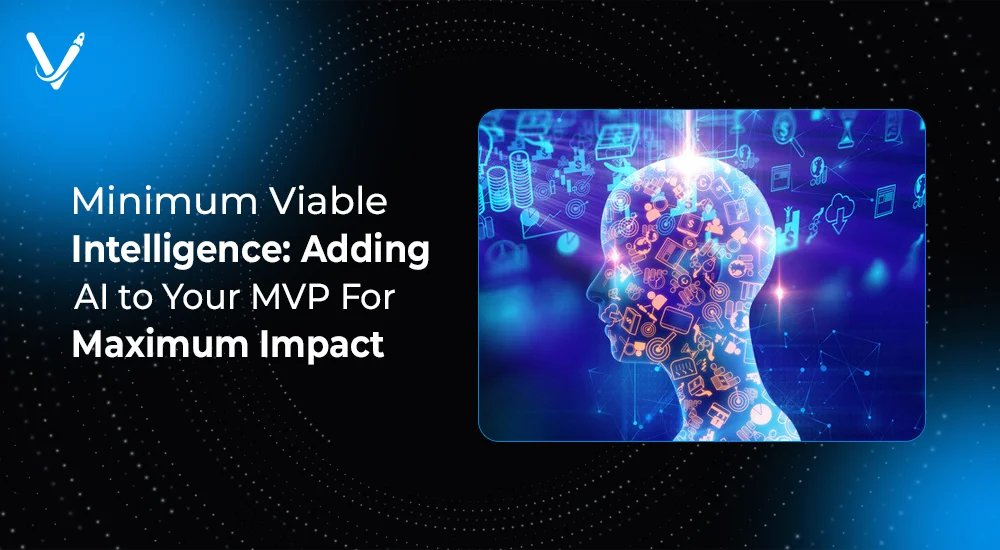Minimum Viable Intelligence: Adding AI to Your MVP for Maximum Impact


- Jul 18, 2025



The digital landscape is changing rapidly. Users expect smarter interactions, and businesses need data-driven insights to stay competitive. Simply building an MVP is no longer enough. The new frontier in MVP development is Minimum Viable Intelligence (MVI)—a strategic fusion of AI capabilities into early product versions that not only validate the core idea but also deliver measurable intelligence from day one.
This blog explores how startups and product teams can enhance MVP development by integrating AI features, what tools and techniques make it possible, and how to balance lean execution with smart innovation. Whether you’re crafting a marketplace MVP, a mobile app, or an internal tool, adding a layer of AI can unlock extraordinary product-market fit.
Before diving into AI, let’s briefly revisit what is a Minimum Viable Product. At its core, a Minimum Viable Product (MVP) is a product with just enough features to attract early adopters and validate a business idea with minimal resources.
Key traits of an MVP:
MVP in software focuses on building a lightweight yet functional version of the product. It uses tools and frameworks to accelerate development, often integrating feedback loops like A/B testing and analytics.
In contrast, what is an MVP in business? It’s more strategic: a tool to validate assumptions, test market interest, and guide investment decisions. MVP product development helps entrepreneurs avoid building features nobody needs and pivot faster when required.
Adding intelligence to an MVP isn’t about building ChatGPT into every app. It’s about integrating smart systems that provide value, automate decisions, or personalize experiences early on. This new direction—MVP AI—means your product learns and adapts from its first users.
Why AI matters in MVP development services:
Example:
A fintech startup launching a minimum viable product for budgeting doesn’t need to build full-scale automation. Instead, integrating a rule-based AI engine that categorizes expenses and offers basic saving tips makes it “intelligent” enough to attract real users.
When outsourcing or planning your MVP development, modern agencies no longer treat AI as an “add-on.” Top-tier MVP development services now include:
E-commerce: Smart search, personalized product recommendations
Healthcare: AI symptom checkers, appointment optimization
EdTech: Adaptive learning modules, content summarization
Real Estate: Price prediction, location scoring
Marketplaces: Fraud detection, trust scoring
Even a lean marketplace MVP benefits significantly from AI by implementing fraud detection, AI-powered matching, or intelligent onboarding—building trust without overwhelming features.
No matter how exciting the technology, AI must support your MVP’s central hypothesis. Ask:
Instead of sprinkling AI for marketing buzz, find critical user journeys where intelligence enhances outcomes:
Example:
A fitness tracking app MVP can use AI to generate personalized workout suggestions based on the user’s initial input and real-time progress. This builds retention early without full-blown machine learning infrastructure.
Avoid reinventing the wheel. Use open-source or cloud AI tools that integrate quickly:
Use AI to measure intelligently:
Your MVP is no longer a one-way street. With AI, it becomes a learning engine that adapts to feedback and grows smarter with every interaction.
Notion’s early minimum viable product focused on note-taking and collaboration. When it introduced AI-powered summaries and writing assistance, user adoption surged. It wasn’t just useful—it became indispensable.
Replika began as a chatbot MVP for companionship. By integrating NLP and sentiment-aware AI early on, it evolved into a full emotional support platform with millions of users and paying subscribers.
Cleo, the financial assistant, started as a simple bot that answered basic questions. By embedding AI to understand spending behavior and give witty financial advice, Cleo quickly stood out in a crowded space.
Don’t let lack of resources stop you. Building MVPs with AI is easier today due to:
These platforms reduce the time, cost, and risk of launching an MVP in software development that includes intelligent features.
Building a marketplace MVP? AI isn’t optional—it’s a competitive edge.
AI can enhance:
Example:
A property rental platform MVP used AI to score listings based on historical prices, amenities, and photos. Result: higher user satisfaction and trust, even in the MVP stage.
Today, what does MVP stand for in business? It no longer just means "the smallest version of your idea." It now includes:
In this new paradigm, Minimum Viable Intelligence is a mindset. You start lean, but you start smart.
AI may be tempting, but not every MVP needs it. Here are traps to watch out for:
As AI becomes more democratized, embedding intelligence will be the norm—not a differentiator. Future-ready MVP software will:
Whether you're just learning how to build an MVP or optimizing a second iteration, the smartest move is to prepare for a world where AI is expected, not exceptional.
Integrating Minimum Viable Intelligence into your MVP isn’t about building AGI into a prototype. It’s about empowering your earliest users, capturing deeper insights, and iterating faster with smarter tools.
In today’s fast-paced digital environment, MVP development with AI at its core helps you:
Looking to build an AI-enhanced MVP that your users love and investors notice? Partner with a team that understands both lean startup principles and cutting-edge AI tools.
Get in touch with us—we help you launch faster, smarter, and more intelligently.
Copyright © 2026 Vasundhara Infotech. All Rights Reserved.